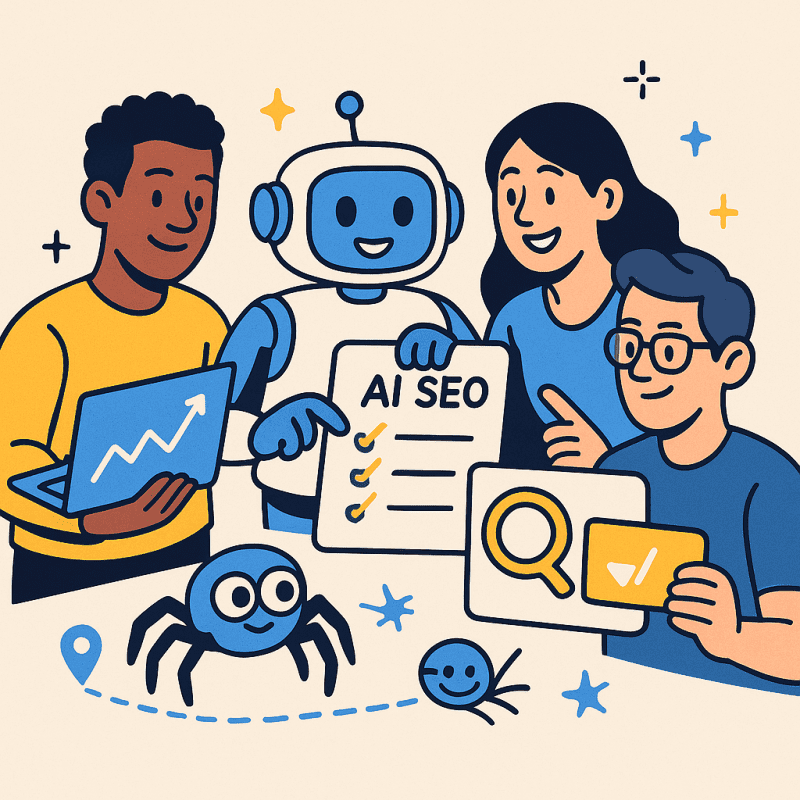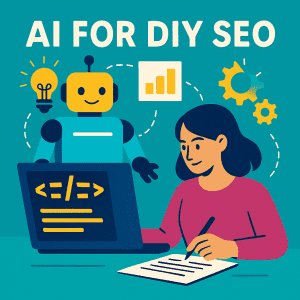💡 Save Time, Stay Smart, Rank Better
Getting your website to rank on Google has always required time, strategy, and a touch of know-how. But thanks to AI, the playing field is changing – and fast.
What used to take hours (or days) of painstaking effort can now be accelerated with the help of smart tools that work with you, not against you.
Whether you’re a small business owner wearing too many hats or a solo entrepreneur juggling your own marketing, AI can be your digital sidekick. From generating keyword-rich content and analysing competitors, to spotting broken links and suggesting improvements, AI gives you an extra set of eyes – and a turbocharged brain – to handle the heavy lifting.
🕒 Save time by automating repetitive tasks like writing meta descriptions, formatting blog posts, or even generating ideas for new content.
🧠 Stay smart by tapping into tools that learn from best practices and are trained on millions of data points – giving you insights you might not spot on your own.
📈 Rank better because your SEO efforts become more consistent, data-driven, and aligned with what search engines actually want to see.
Importantly, you stay in control. AI isn’t here to replace your creativity or your voice – it’s here to amplify it. With the right approach, you don’t need to be an SEO expert to make a real impact. You just need to know which tools to use, how to guide them, and when to take the reins yourself.
This guide will walk you through exactly that. No tech jargon. No hype. Just a clear, human-friendly way to combine your ideas with artificial intelligence – and turn good intentions into great rankings.

🧠 What AI Can Help You Do
- ✍️ Generate blog ideas and outlines
- 📝 Write and optimise content
- 🔑 Suggest keywords and topics
- 📄 Create meta titles and descriptions
- 🔍 Check content for structure and clarity
- 📊 Analyse competitor websites
🛠️ Popular AI SEO Tools
- 💬 ChatGPT – Generate content, ideas, and outlines
- 🔍 SurferSEO – Content grading and optimisation
- 📊 NeuralText – Keyword suggestions and outlines
- 📝 Copy.ai – Product descriptions and blog content
💡 Best Practices for Using AI in SEO
- 🧠 Always add a human touch—review, edit, and fact-check AI content
- 🧾 Don’t rely solely on AI for keyword research—use it to support your own findings
- ✍️ Use AI to improve productivity, not replace strategy
- 📉 Avoid over-automating—Google values authenticity and relevance
🚫 Common Mistakes to Avoid
- ❌ Copying and pasting AI content without checking
- ❌ Using AI to spam keywords or create “fluff” content
- ❌ Publishing articles with errors or inconsistencies
- ❌ Thinking AI knows your audience better than you do
✅ Quick Recap
- 🤖 AI can help you save time and stay consistent with SEO tasks
- 📄 Use it for content ideas, writing, optimisation, and audits
- 🧠 Always review and adapt AI content to suit your audience
🤖 Final Thoughts
AI tools are invaluable for DIY SEO, but their real power comes when paired with your own expertise.
Rather than handing off the entire process to an algorithm, use AI to automate routine tasks – like generating topic ideas, drafting outlines and suggesting meta tags – so you can focus on adding context, examples and brand-specific insights that machines can’t replicate.
This collaboration speeds up your workflow while ensuring content remains authentic and aligned with your audience’s needs.

To get the best results, approach AI like a junior colleague: give it clear instructions, review every suggestion, and fact-check its outputs before publishing.
Use AI for brainstorming and first drafts, then refine headings, tone and structure to match your goals.
Regularly measure performance in Google Search Console and Analytics to see which AI-assisted pieces resonate, and iterate based on real user behaviour.
By combining AI’s efficiency with human oversight, you’ll build SEO-friendly content that ranks well, engages readers and stands the test of time.
🤖 Recap and Clarify: Page-Specific FAQs
Can AI really help me do SEO on my own?
What AI tools are best for DIY SEO?
Will AI-generated content rank well in Google?
Can AI do technical SEO tasks for me?
Is AI good for keyword research?
Can I use ChatGPT to write all my website content?
How do I prompt AI for better SEO results?
Will Google know if my content is written by AI?
Is using AI a shortcut or a smart strategy?
What are the risks of relying too much on AI?
🔁 Up Next!
SEO Tools & Case Studies – There’s no shortage of SEO advice out there—but how do you know what actually works? This section of The SEO Guide Book is all about showing results, not just theory.
Video Recap – 🤖 Using AI for DIY SEO – Smarter Tools, Better Rankings
AI can’t replace SEO – but it can make it a lot easier. In this video, I’ll show you how to use AI tools to do SEO yourself, save hours of work, and get better results without breaking the rules.
AI is your assistant, not your replacement. Use it wisely, add your human touch, and your SEO will stand out from the crowd.


